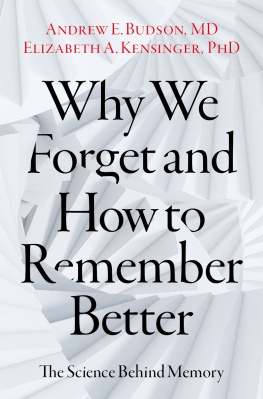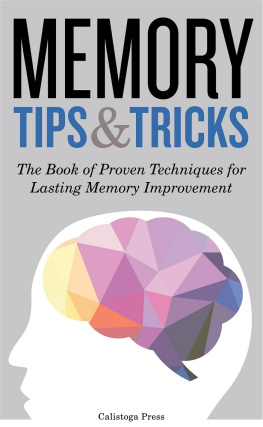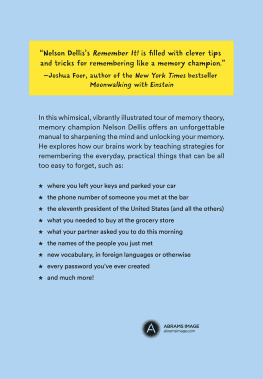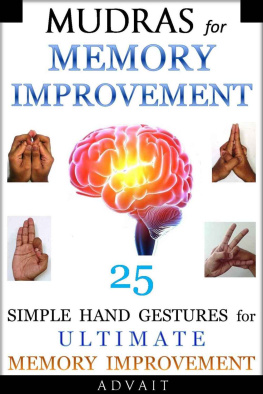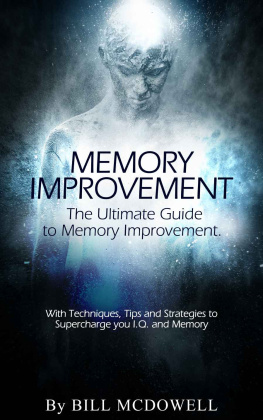Improve Your Memory Today! Discover the MemoryImprovement Tips and Study Skills of the Ancient Greeks
By Vernon Macdonald
Copyright 2013 byVernon Macdonald
Smashwords Edition License Notes
This eBook is licensed for your personalenjoyment only. This eBook may not be re-sold or given away toother people. If you would like to share this book with anotherperson, please purchase an additional copy for each recipient. Ifyoure reading this book and did not purchase it, or it was notpurchased for your use only, then please return to the applicableeBook store and purchase your own copy. Thank you for respectingthe hard work of this author.
Moonwalking with Einstein
Knowledge is love and light and vision Helen Keller
I recently saw an interview with author andscience writer Joshua Foer. He is the author of the bookMoonwalking with Einstein, which chronicles his adventuresand explorations of the world of memory competitions. Thesecompetitions, which are held all over the world, featureindividuals who are seemingly capable of almost superhuman feats ofmemory and recall. Memorizing the order of multiple decks of cards(one gentleman took an hour to memorize 60 decks) or 4000 binarynumbers (1011001, etc.) are just a few examples of common featsthat all competitors are expected to perform. How do they do it?Are they all Rain Man-like savants? These are the questions thatJoshua Foer set out to investigate and answer.
To his surprise, the competitors he met werenot savants at all. Although they had their quirks (how many peopledo you know who compete in memory competitions anyway?) they weresurprisingly normal and none of them claimed to have any specialabilities. In fact, most of them claimed to have extremely averagememories. The only difference, they claimed, between theirturbo-charged brains and that of a regular person is that they hadtaken the time to train them. Anyone could improve their memory ifthey wished, these memory competitors asserted, so long as yourewilling to put in a little bit of work.
There was a time when having what appeared tobe superhuman memory abilities was not that uncommon. In ancientGreece, great orators and philosophers such as Cicero and Platowere famous for memorizing long speeches and poems. Whats more,the art of recall was not limited to these mental giants. Thecommon people of ancient Greece, from farmers to bakers tocraftsmen, all possessed powerful memories. The reason for this wassimple necessity. At this time, even paper was a luxury and notavailable to all. This meant that if you wanted to rememberimportant information you had to memorize it. This is why ancientcultures all over the world developed memory training techniques ofvarious kinds. To them, the abilities found at Joshua Foers memorycompetitions would not seem so unusual. They were simply theabilities needed to live in their world.
Since those times various technologicaladvancements have been made, everything from cheap paper becomingwidely available to computers and cell phones. The net effect ofthis is that people all over the world have been essentiallyoutsourcing their mental abilities to these various technologies.Why commit a phone number to memory when you can simply store it onyour cell phone? Why memorize a grocery list when you can justscribble it down on some scrap paper? There is nothing wrong withthis but most of us have taken it to such an extreme that when weneed to use our memory it is not there for us. It has becomeatrophied from lack of use. Your ability to learn and recallinformation is not unlike a muscle in your body. If you dontexercise your biceps, for example, they will become weak and flabbyin no time. The same is true of your memory muscle. If you dontuse it, your memory muscle will become weak and flabby as well.This is why most people in the modern world have such lousymemories. Thats the bad news. The good news, though, is that witha little effort you can whip your own personal memory muscle intoshape in no time.
Improve Your Memory Today!
The journey of a thousand miles begins withone step Lao Tzu
In Moonwalking with Einstein JoshuaFoer recounts how many of the memory champions he met were actuallytested by curious scientists. Were their brains any different thana normal persons? It turns out that the scientists confirmed thatthere was nothing cognitively different about them, meaning theywere not smarter than the average person. The only difference thatwas found was when the champions had their brains mapped by an FMRI(Functional Magnetic Resonance Imaging) machine. It found that whenperforming tasks that required memorization, their brains wouldlight up in the areas related to spatial memory and navigation. Thetakeaway from this is that there is nothing special about peoplewith superior memories. Its not that the rest of us dont havethese areas of the brain; we just have not trained our minds to usethem.
Everyday we are bombarded with informationthat our brains must make sense of. Which information is importantand which isnt? It turns out, unsurprisingly, that our brains aremuch more likely to remember information that is somehow unique,interesting, and related to already-established memories.Information that is utterly untethered from our experience is muchharder to remember. In Moonwalking with Einstein, JoshuaFoer explains this in terms of the baker/Baker paradox. Here is abrief explanation of this psychological concept.
Imagine that you are at a party where you areintroduced to a man named Ted Baker. You talk to him briefly beforemoving onto some of the other guests at the event. Later you meetsomeone else whose occupation happens to be that of a baker. Youtalk to him briefly as well. Now imagine that at the end of thenight I show you a picture of Ted Baker. How likely are you toremember his name? Most likely you wont. You might remember hisface but his name will likely be forgotten. Now I show you picturesof a number of guests at the party. Are you able to pick out whichone is a baker? Most likely you will. Why is this? Why can youremember baker the occupation and not Baker the man?
The reason for this is that the name Bakermeans absolutely nothing to your brain. It is completely unrelatedto your experience and your reality. You have nothing to associateit to, which makes it unmemorable and, therefore, easilyforgotten.
A lower-case baker, on the other hand, is ajob that conjures up images in your mind. Bakers work in kitchens,dress in white, and they wear funny hats. Maybe you recall thesmell of freshly baked bread or can see a man covered in flour. Thejob baker means something to you because other memories reinforceit. Unlike the name Baker, a baker has context, significance, andmeaning for you. The whole key to developing your memory involvesturning upper-case Bakers into lower-case ones. The memorytechniques you are about to learn all do this to one extent oranother. Put another way, the key to having an effective memory isto make your memories memorable. This is really all theotherwise-normal-in-every-way memory champions do.
Working Your Memory Muscle Its a Must
Before anything else, preparation is the keyto success.
Alexander Graham Bell
We are now just about ready to start learningsome specific techniques and study skills that were literallytaught in ancient Greece. Once mastered, these skills will improveyour ability to remember and recall information in no time. Havingsaid that, though, I do feel compelled to give you this harsh truthright off the bat. In order to see real improvements in your memoryit will take some work on your part. Let me repeat that. It isgoing to take some WORK. It amazes me how many people think thatsimply reading a book on improving your memory will produce thatresult. Will reading a book on becoming a better runner help youimprove your time if you dont actually run? Of course not! Noworthwhile skill or bit of knowledge that you may wish to acquirecomes without a price, and that price is effort. Dont deludeyourself. If you want to dramatically improve your memory it isgoing to take some effort.



